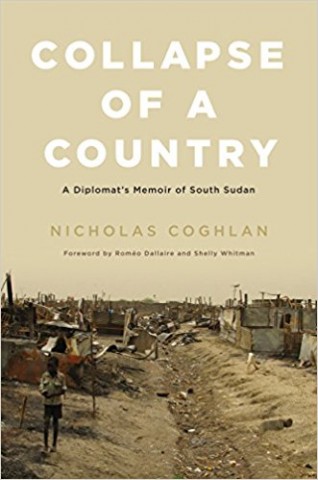When I first came across Nicholas Coghlan's "Collapse of a Country: A Diplomat's Memoir of South Sudan" (2017), I passed it up. Memoirs can be interesting, but not always great (unless you are interested in the day to day activities and experiences, often without in-depth contextualization). However, while on route to South Sudan myself, I read the book, and highly recommend it. It is a fascinating read, and quite well contextualized in issues well beyond a typical memoir.
On governance, one of the journalists he speaks with explains "Yes, there is a tendency towards dictatorship in South Sudan," he admit. "But you know what? This will never be a dictatorship like Eritrea's. To be a dictator you have to be efficient and you have to have a vision. Neither apply in our case." (p. 47).
On conflict resolution: The resolution of the Jonglei Crisis had followed a well-worn pattern. A Big Man becomes dissatisfied with the status quo and finds himself unable to get his way by peaceful means. He takes to the bush and assembles an armed militia. He creates mayhem. In the end, he accepts an offer of cash and promotion and comes back in. Until next time. The practice often brought peace in the short term, but over the medium to long term, It encouraged and rewarded rebellion." (p. 70). See also De Waal (2015) on this point. There are some challenging reflections on the future, such as Coghlan's reflection that "it would take more than a generation for South Sudan to get over this situation [lived experiences of conflict]" (p. 32). As the peace negotiations enter into new rounds, with similar faces making few compromises, the prediction continues to be a likely one.
On aid and priority setting: "A particularly interesting finding of the in-country surveys was that most communities identified inter-ethnic reconciliation as their top priority for donor support (this with the caveat that polling and surveys are notoriously problematic in South Sudan). I was intrigued but not surprised by this after years of observing the civil war, which as often as not pitted southerners against each other rather than against northerners. But for newcomers to South Sudan, this seemed aberrant. More to the point, how could you achieve "reconciliation" and how did you establish benchmarks? When we huddled with the government to reach a consensus over priorities, reconciliation shifted near the bottom of the list" (p. 108).
On the (lack) of accountability: "A very large convoy of World Food Program trucks carrying mainly food supplies north to the POC camp in Bentiu was hijacked and looted near Mundri, Western Equatoria State. When they were released, the drivers described their assailants as armed and uniformed. There was no doubt about where at least three of the trucks were taken; GPS tracking showed them to be inside the SPLA barracks in Yei. WFP supplied all donors with a list of the value of their goods that had been stolen; in the case of Canada, the total was US$ 300,000. But WFP insisted that we not a make public statement, let alone press the government for an explanation. They were more concerned with getting the trucks back in tact – forget the food seized – and not endangering further their already difficult relationship with the government." (p. 199)
On Canada and staffing challenges (and some self-reflection): "It seemed that the younger generation in the Canadian foreign service were not motivated by what had attracted me: the prospect of travel to exotic places, a whiff of danger and excitement, and being a big fish in a small pond. They preferred the classic "cushy" posts – London, Rome, Washington – if they wanted to go abroad at all." (p. 197)
1530 Hits
Featured Posts
Tags
Ethics
Books
Ethiopia
Post-doc
Governance
Land
Resilience
decolonization
Racism
Economics
Globalization
Rural Development
Ethnography
Poverty
Revolution
Capitalism
Interdisciplinary
Leadership
Power
South Africa
Africa
Sustainability
Food Security
Human Rights
Gender
Inequality
Ideology
Participation
Policy
Civil society
Colonialism
Culture
Anthropology
International development
Conflict
Development
Climate change
Institutions
Agriculture
Development Studies
Education
Islam
Fellowship
Colonization
History
Democracy
Migration
Qatar
Politics
Middle East

